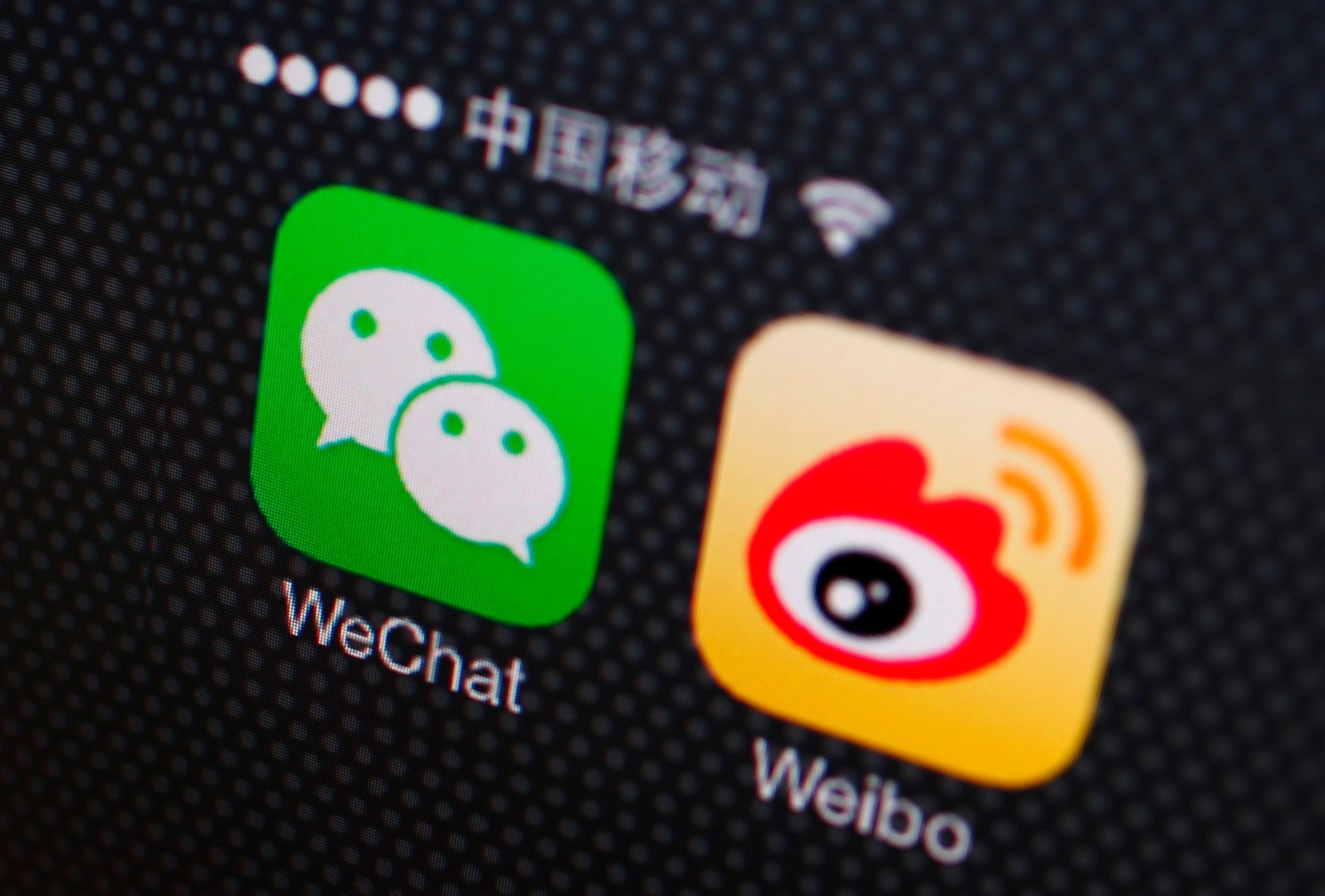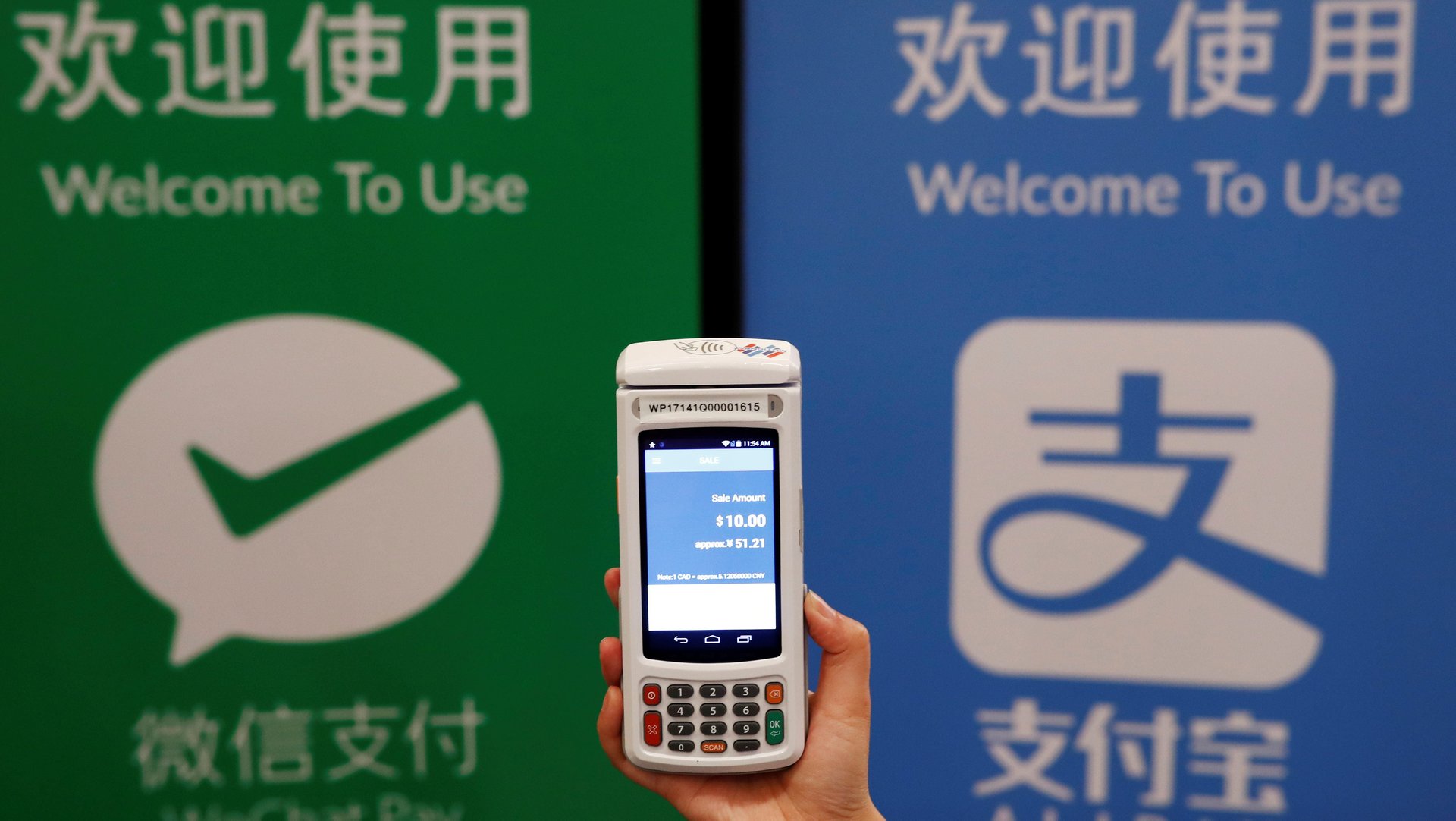WeChat is setting a blueprint for the world’s social networks
For many people in China, WeChat is the internet.


For many people in China, WeChat is the internet.
The all-encompassing app is the flagship product of Tencent, China’s $450-billion market cap gaming and social giant founded two decades ago. Since its launch in 2011, WeChat—known in China as Weixin—has evolved from a messaging app to a service platform. Its more than 1 billion users, mainly in China, find it hard to live without it.
The story of WeChat is the story of the emergence of China’s internet in the mobile and social era.
In the 1990s, at the dawn of the internet age, websites for news and games were the go-to place on the internet for information in China—much like they were around the globe. Then in the 2000s, three new local companies—Baidu, Tencent, and Alibaba—quickly harnessed the power of the Chinese internet, dominating the search, communication, and e-commerce industries, respectively. From 2010, smartphone sales in China took off, paving the way for the emergence of a unified platform where people can accomplish a mind-boggling number of tasks with just a few taps.
WeChat, today, offers a combination of services available from several different companies in the West, including Facebook, Snapchat, Amazon, Google, PayPal, and Uber, to name a few. Its comprehensive nature has also made it one of the most powerful tools for government surveillance over Chinese citizens. And apps and social networks in other parts of the world may soon be a lot more like it.
“At the moment [WeChat] is so pervasive in people’s lives that it has become a primary window into Chinese internet, if not the Chinese internet itself,” said Lotus Ruan, a researcher with Citizen Lab, an internet research group based at the University of Toronto.

The app to fight loneliness
Tencent was founded in 1998, but it didn’t launch WeChat until 2011.
That’s when a Canadian instant messaging app called Kiki caught the attention of Zhang Xiaolong (sometimes known as Allen Zhang), then a product manager at Tencent, after he read about it on his news feed on QQ, Tencent’s flagship social media product at that time. He wrote to Tencent’s founder, Pony Ma, and suggested making a similar product. Zhang recalled that it only took an hour or two (link in Chinese) for Tencent to say “yes” to the idea and that product is Weixin (WeChat’s domestic version. The story uses WeChat to refer to both apps, except when referencing the number of users for each).
When WeChat launched in January 2011, around two months after the product team started building the software, it received lukewarm reactions. To the early users—primarily people working in the internet industry—the chat function alone wasn’t very attractive, Zhang recalled in the company’s official history, Tencent Biography: 1998-2016, because SMS messages had become more affordable by that point. It was the “push to talk” function that helped WeChat survive at first. Another WeChat product team member later recalled that without that feature, WeChat could have been dead (link in Chinese) before October that year.
WeChat really became popular because of its ability to connect strangers. In 2011, WeChat rolled out its “shake” feature, which allowed users to shake their phones and connect with other users who were doing the same at that moment. That’s an inspiration from QQ’s “drift bottle,” a hookup feature allowing users to “throw” bottles containing either a text or voice message into a virtual ocean or “pick up” floating ones on QQ’s email service.
Before WeChat took off, Zhang created a free email service (tweet in Chinese) that Tencent acquired in 2005. Zhang was known within Tencent for two things—he liked smoking cigarettes (link in Chinese) from the American brand Kent, and he was a good tennis player (link in Chinese).
And yet, in 2012, a little over a year after it launched, WeChat had reached 100 million users. It took Facebook four years, and Twitter five years, to get to similar figures.

The three battles that shaped WeChat
It was a small team, seemingly out of nowhere, that helped Shenzhen-based Tencent leapfrog its competitors. Three crucial battles shaped the Tencent—and Chinese internet—we know today.
The first one, known as “the 3Q big battle,” was between WeChat’s computer-based predecessor, QQ, and the anti-virus service Qihoo 360. QQ was Tencent’s first popular instant messaging product with a key function of connecting virtual strangers—vital at a time when millions of young people were leaving their homes to work in cities where they knew no one.
In 2010, Qihoo360 accused QQ of scanning users’ private data. Tencent responded by stopping services to those among the 600 million QQ users—nearly half of China’s population at the time—who had installed Qihoo’s software on their computers. One enterprising firm came up with a patch to allow people to keep using both.
That tussle was instrumental in moving China’s internet giants beyond looking only at personal computers for building their user bases, according to Tencent Biography. QQ was able to gain hundreds of millions of users at a time when computers were still rare—there were only around 5.7 computers per 100 people in China in 2006. QQ offered a blueprint for “stickiness” and revenue via gaming and top-up services that WeChat could build on in the mobile era.

The next major battle for Tencent was with Weibo, the Twitter-like microblogging site run by Sina, one of the three major news portals, around 2010 (link in Chinese). Tencent had tried building its own microblog, Tencent Weibo, but it was losing out to Weibo as China’s preferred public sphere.
“This was something truly new for public discourse in China—a national forum open to anyone with internet access and a little skill. Even though it was and remains censored [by the government], this was, in my view, the height of openness and dynamism in the architecture of China’s public sphere,” Graham Webster, a technology-focused editor at Washington, DC-based think-tank New America, told Quartz in an email.
If Weibo was a public square, WeChat was a walled garden. “Instead of Twitter-like individual broadcasts to mass audiences, WeChat discussions took place in group chats of limited size,” Webster told Quartz. “For users, this made for more intimate discussions with less risk of public or government backlash. For the government, this made it less likely that conversations could quickly spiral out of official control,” he said. “WeChat happened to rise at a time when the Chinese government sought to take back some control in this online public sphere dominated by Weibo.”
The third battle, still ongoing, is between payment giant Ant Financial’s Alipay and WeChat.

In 2013, WeChat launched a feature that allowed users to put money into a “digital wallet” (link in Chinese). Now Alipay—developed under e-commerce giant Alibaba, with whom Tencent has fought a fierce, cash-burning battle for years—and WeChat are in a kind of duopoly (Quartz member exclusive) in China’s digital currency market. WeChat Wallet is “the Trojan horse that allows WeChat to quickly onboard user payment credentials that then unlock new monetization opportunities for the entire ecosystem,” wrote Connie Chan, a partner at the Silicon Valley venture capital firm Andreessen Horowitz, in 2015. WeChat Wallet has meant that merchants with WeChat accounts are able to sell products and services easily.
In February 2018, WeChat reached 1 billion registered users (link in Chinese). It also recorded 1.2 billion daily transactions (link in Chinese) by the end of last year. At Berkshire Hathaway’s annual meeting in 2018, Warren Buffett’s business partner Charlie Munger noted the threat WeChat posed to credit cards and other payment handlers, saying: “We have a big position in American Express, and there is one tiny cloud on the horizon of the payments processors and that is the system of WeChat in China.” Big financial companies seem to both respect and fear (Quartz member exclusive) China’s online payment systems.

“One man’s meat is another man’s poison”
It’s simply hard to imagine a world without WeChat.
“You can hardly get by without a smartphone or WeChat these days in China,” said Ruan, the Citizen Lab researcher. “WeChat’s monopoly over the Chinese internet also makes it nearly impossible for average users to negotiate their rights with the platform… However, one man’s meat is another man’s poison.”
China’s internet is often referred to as “The Great Firewall,” because the Chinese government strictly regulates and monitors the content of the country’s roughly 800 million online citizens. WeChat has further strengthened that closed system; WeChat’s privacy policy makes it clear that information will be shared with the government when requested.
Its features have made surveillance a near inevitability. First, in 2017, WeChat introduced a search service within the app, as sentiment in China turned against search giant Baidu. That came after regulators in 2016 imposed limits of Baidu’s advertisement business because of its problematic practice in prioritizing search results. Also in 2017, WeChat rolled out mini-programs that allowed users to access third-party apps and services without leaving WeChat, giving the company—and, almost certainly, China’s government—more data on user behavior in the process.
As of early 2018, there were close to 600,000 mini-programs offered by both third-parties and WeChat with 170 million daily active users, through which users could carry out quotidian tasks like paying bills, buying insurance, donating money, booking flights, buying movie tickets, and ordering food. Users in certain regions in China can even create their own digital ID cards needed for all the services above.
WeChat has access to a staggering amount of intimate and real-time information on its users, making it a perfect surveillance tool for the government. For instance, police have arrested people for writing comments that are critical of the Chinese government in private chats. It’s not unprecedented that governments should crack down on dissidents based on what they say on social media, but the Chinese government has far more information than most because of the sheer amount of time people spend on WeChat.

Will WeChat lead the next phase of the internet?
WeChat has been able to stave off any serious competition over the last eight years—but products from ByteDance, the world’s most valuable startup, may finally be making Tencent nervous.
China’s obsession with short videos has made ByteDance’s Douyin massively popular, especially among younger users. (Douyin had 500 million monthly active users (link in Chinese) as of 2018). Because people are spending more time live-streaming, users’ time on WeChat dropped by 3.6% between 2017 and 2018. Douyin’s overseas version, TikTok, appears to have achieved liftoff outside China more quickly than WeChat did, with the app gaining more than 200 million users (paywall) in India alone since its global debut two years ago. Compare that to WeChat’s overseas users, which reached 70 million in 2013 (link in Chinese); the company told Quartz it doesn’t break out those figures anymore.
“WeChat is more functional, Douyin is more entertainment-driven,” noted Wilfred Wang, a media researcher at Australia’s Monash University, who said he’s “a bit skeptical about these platforms such as Douyin—can they last, how well can they last? The longevity will be shorter than something like WeChat.”
Still, WeChat’s latest moves clearly target Douyin. Late last year, it rolled out a video-streaming feature. WeChat has also blocked access to TikTok using WeChat accounts. Users were unable to log into TikTok using WeChat at one point. And Tencent forbids direct video shares from Douyin to WeChat, a reprise of Tencent’s tactics against Qihoo nearly a decade ago. In a four-hour-long speech (link in Chinese) in January, WeChat’s creator Zhang talked about the platform’s plans for the next eight years and insisted that WeChat doesn’t have any competitors. “If there’s a competitor, it’s ourselves… WeChat has no anxiety,” he said.
The WeChat team doesn’t focus on how much time users spend on WeChat, but instead on people’s engagement, such as completing transactions on the platform, Matthew Brennan, who tracks Tencent at Shenzhen-based marketing agency China Channel, told Quartz. WeChat does need to find its next big thing, he added, but it’s not entirely clear yet what that might be, beyond further cultivating the mini-program ecosystem and developing extra features for WeChat.
WeChat is losing dominance and may be stalling out—but it’s blazed a trail others are trying to follow. Earlier this year, Facebook’s founder Mark Zuckerberg said that he regretted not paying more attention when tech experts advised Facebook to look to WeChat. He’s doing that now, with plans to incorporate nearly all the functions the Chinese app provides—video chats, group stories, payment services, e-commerce—into Facebook’s offerings.
“Every two to three years, Tencent knocks something over the fence,” said Jeffrey Towson, a professor who teaches technology and business at Peking University. “They keep coming up with these big home runs, not every year, but every couple years. And what has Facebook come up with over the past 10 years? Nothing,” Towson said.
While tech giants from the West want to bring the WeChat experience to foreign users, WeChat is already taking the Chinese internet experience overseas. The platform has been playing a growing role in elections worldwide, including in Australia and Canada, where local politicians have tried to win votes from diaspora Chinese. It might not always make the best first impression—in some cases, WeChat has been a tool to spread fake news, like other social apps—but it’s there, and the world has begun to embrace it.
Mary Hui contributed reporting.